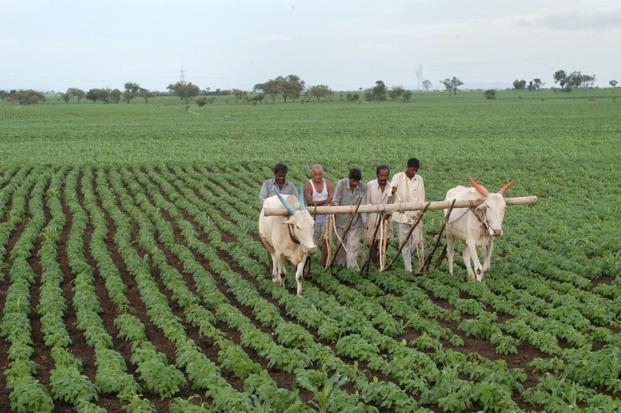A Coup De Grâce for Farmers and Agriculture

Representational image. Image Courtesy: Hindustan Times
The central government’s new farm legislations, while dismantling the existing regulations that govern markets, farming, and trade, leave the field wide open for a corporate takeover of the last vestiges of agriculture, as it stands in the country today. Already in the past, since the Green Revolution, agriculture has been all but privatised. Seeds, fertilisers, water, power are all things the farmer pays for and now it is the land which is being eyed by the government to push contract farming in an insidious manner through law. Gone are the days when the farmer used to save and reuse seeds or select and grow improved varieties of crops. Hybrids seeds and private companies ensure that the farmer has to make an investment in something as basic as a seed.
The three bills, replacing the earlier ordinances, namely the Essential Commodities (Amendment) bill, 2020, the Farmers’ Produce Trade and Commerce (Promotion and Facilitation) bill, 2020 and the Farmers (Empowerment and Protection) Agreement on Price Assurance and Farm Services bill, have certain perplexing provisions, especially when they are supposed to benefit the farmer. But once you realise that it is not really the farmer who stands to gain, all is clear.
In the name of empowering the farmers and removing the fetters on stocking, sales and markets, these new laws primarily remove the government interface by leaving everything legally to private players. The state had already divested its responsibility from agriculture many decades ago and these new bills are a coup de grâce.
Clearly, it is not only farmers who are outraged by the new laws, ostensibly aimed at improving their lot, but also the institution of democracy. The ruling party does not have a majority in the Rajya Sabha, and the ruckus amidst which the second farm bill was passed, does little credit to any law-abiding country. Yet, we hear that farmers stand to gain the most and nothing was done for them in the last 70 years. Remember, this was a country that coined the slogan Jai Jawan Jai Kisan!
The earlier regulations under the Essential Commodities Act regarding stocking, inspection, permission to visit, search or take stock, have been done away with and there is no restriction on hoarding (sorry storing) produce or selling goods. This is supposed to enhance the farmers’ income. I am guessing that this move must have come after the government realised there are a large number of farmers with huge godowns in which they stock their unmanageable produce and wait for the right price (on the internet, of course) and then sell for a fat profit.
While passing the Essential Commodities (Amendment) bill, the Union Minister of State for Consumer Affairs, Food and Public Distribution, Raosaheb Danve said this amendment is required to prevent wastage of agri-produce due to lack of storage facilities. That is an admission that the government did not bother to enhance the storage for farmers all these years, even as its own godowns are barely able to contain stocks it procures.
For years, farmers, for instance in Vidarbha, have been demanding godowns to stock cotton, so they can sell when the prices are high, but this has never happened. Now with no ceiling on stocks, except in extraordinary circumstances, and the bypassing of the Agricultural Produce Marketing Committees (APMCs), farmers are expected to find buyers who offer a good price. India’s first Prime Minister Jawaharlal Nehru is quoted as saying, “Everything else can wait but not agriculture”. Since Independence, the farmers have been waiting and their patience has solidified over the years into deep fatalism, as is evident in the over 3,00,000 farmer suicides in the country recorded by the National Crime Bureau since 1995.
The government has permitted contract farming under the Farmers (Empowerment and Protection) Agreement on Price Assurance and Farm Services Act. This “means a written agreement entered into between a farmer and a Sponsor, or a farmer, a Sponsor and any third party, prior to the production or rearing of any farming produce of a predetermined quality, in which the Sponsor agrees to purchase such farming produce from the farmer and to provide farm services”. While there is a redressal mechanism for grievances, the provision seems cavalier and would need some oversight to ensure that the farmers are not cheated or divested of their land.
Farmer organisations like the Alliance for Sustainable and Holistic Agriculture (ASHA) have contended that there is little that can be empowering or progressive in these legislations, apart from providing a fillip to agribusiness. It is not surprising that the new provisions have raised the collective hackles of the farming community across the country, with some exceptions, many of whom do not even manage to sell their produce at the recommended Minimum Support Price (MSP) that the government declares from time to time.
As Sudha Narayanan from the Indira Gandhi Institute for Development Research (IGIDR) has pointed out in a webinar hosted by ASHA, only changing the rules of the game is not enough. The farmers need state support more than ever before and the new laws seem to have punctured the already uneven playing field with a new regime in which they will flounder even more.
Remember the voluminous five-volume reports of the MS Swaminathan Commission? They gathered dust till the NDA government decided it should increase the MSP according to its recommendations by 50% above the cost of production. While what this government announced is not what the Swaminathan report recommended, the MSP has little meaning unless the government is procuring the farmer’s produce. For instance, the MSP of cotton may be Rs.4,755 to Rs.5,405 (for short and medium staple) per quintal and Rs.5,450 to Rs.6,750 for long and extra-long staple (for the 2019-20 season), but how many farmers actually received that amount?
The market prices are often below the MSP, and in the absence of assured procurement, the farmer is often forced to sell to the local traders who pay them upfront. In Vidarbha this year, Covid-19 pushed the price down and the farmers sold cotton for less than the MSP. According to Anup Chavan, the former sarpanch of Bothbodhan village near Yavatmal in Vidarbha, “The farm laws are not for farmers—they will help traders and private players who have money to invest in contract farming. Instead of helping the poor farmer, the government is on the side of the rich,” he said. Chavan said farmers sold their cotton for Rs.4,200 a quintal this year as prices were depressed, despite the MSP being well over Rs.5,000.
Farmers may feel that contract farming can help grow improved varieties of crops, but that will skew the market as the produce of those who do not have access to hothouses or expensive and exotic seeds will be at a disadvantage, he pointed out. Many farmers sell through the Agricultural Marketing Produce Centres (even though, as in Maharashtra, you can sell outside of it) as they have a network of farmers representatives whom they know. While it may not be an ideal situation everywhere, at least there was a framework. Now with the emasculation of the APMCs, farmers will be at the mercy of traders, Chavan said.
Meanwhile, the All India Kisan Sangharsh Coordination Committee (AIKSCC) in a statement issued on Tuesday, has criticised the new MSP rates announced by the government and said it was only hiked by 2.6% and “is too meagre to meet the needs of rising livelihood costs.” While the MSP for wheat was Rs.1,925 per quintal, the market price is Rs.1,400 per quintal, the AIKSCC said.
It is clear from the government’s own report that prices rule below MSP for many crops. According to the “Price Policy for Kharif Crops: The Marketing Season 2020-21” by the Commission for Agricultural Costs and Prices (CACP), prices fall below the MSP in the case of paddy, and even tur and other crops. “For the major cotton-producing states, namely, Maharashtra, Gujarat and Telangana, market prices stayed below MSP on most of the days during the kharif marketing season in 2019- 20.”
Also, less than 12% paddy growers benefit from procurement operations. CACP said one of the major constraints faced by farmers, particularly marginal and small farmers, is non-availability of procurement centres near the villages and farmers are forced to make a distress sale to private traders at low prices.
It also said that progress of schemes to improve the agricultural marketing system and ensure remunerative prices to farmers, under the Pradhan Mantri Annadata Aay Sanrakshan Abhiyan (PM-AASHA), “has remained far from satisfactory,” and the budget allocation of Rs.1,400 crore during 2018-19 was unutilised.
To expect private players to make huge investments in the agriculture sector in a pandemic, aimed at helping the farmer, is not only rash but smacks of a lack of accountability on the government’s part. This is a time it should have stood by the farmer instead of leaving her in the lurch.
The author is an independent journalist. The views are personal.
Get the latest reports & analysis with people's perspective on Protests, movements & deep analytical videos, discussions of the current affairs in your Telegram app. Subscribe to NewsClick's Telegram channel & get Real-Time updates on stories, as they get published on our website.























